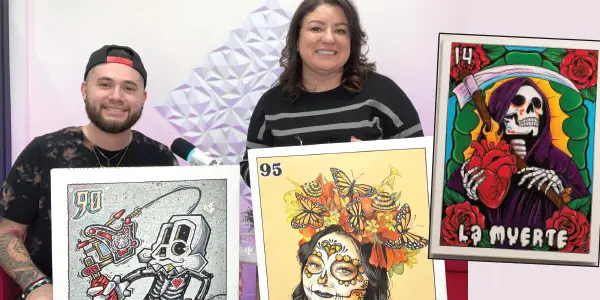
By Jorge Ramos
Alexander is just 11, but he already demonstrates the resilience of someone older who has suffered through difficult situations without being broken. He was separated from his mother, Otilia, for 45 days and sent alone to a detention center thousands of miles away after he and his mother crossed into the U.S.
This is what President Donald Trump’s zero tolerance policy does: It separates families.
When I met Alexander, he was wearing new clothes: a pair of jeans, a black shirt and red sneakers. Gel held his hair firmly in place. Eyes wide open, he carefully observed everything going on around him, saying almost nothing at first.
Who can blame him for the lack of trust? After all, it was not long ago that strangers forcibly separated him from his mother. Perhaps that is why he won’t leave her side now — when I spoke with them recently, they were walking together as if tied to each other with an invisible rope.
Otilia told me that they left Guatemala because of crime and a lack of work opportunities. She told me she left her other children behind, ages 10, 6 and 4, bringing only her firstborn to try and have a better life in the U.S. The rest of her children would have to wait.
They entered the country without permission in Arizona and were soon caught by authorities on the border. The officers put them in a “very hot” van then took them to “the Freezer,” a detention center known for its frigid temperatures. They spent three days there together.
Then an agent asked Otilia a terrible question: “Are you aware that you’re going to be separated from your son?” No, she wasn’t.
From behind a window, Alexander saw his mother be taken away. “Her hands, feet and waist were in chains,” the boy told me, the memory still painful. Soon he was put on an airplane with other boys and taken to a detention center for children in Chicago.
There, things only got worse. “I was hit,” he said. A 14-year-old boy knocked him down and Alexander hit his head on the metal frame of a bed. When he touched the back of his neck, it was wet with blood. He was sent to another room, but the fear remained. Officials who were supposed to protect him never did. The social worker assigned to look after him told him that she didn’t want to see him, Alexander said.
Other boys didn’t fare any better. “I’ve seen kids suffer,” Alexander explained, recalling how he’d seen a 6-year-old fall apart after he was separated from his father. “The next day the boy just couldn’t get up. He had no strength at all. I saw a lot of boys cry,” he told me.
While Alexander was in Chicago, he was able to speak to his mother just twice. She was facing a legal proceeding before an immigration judge, and was told she had to pay $20,000 bail — a prohibitive amount for someone fleeing Guatemala — to be released, she said. Even so, Otilia was not forced to leave the United country without her son. Others in similar circumstances have been deported without their children.
In recent months over 2,300 children have been separated from their parents after crossing illegally into the United States, according to official figures. We will never know the exact number. We do know the government did not fully comply with a judge’s order to reunite all those children with their parents by July 26. Some cases have been complicated by the fact that children can remain in detention centers here after their parents have been deported to their home countries, mostly in Central America , with no resources or information as to how to be reunited.
I asked Alexander if coming to the U.S. was worth it. I was expecting a decisive no from him. To my surprise, he said: “Yes.” Once again, he sounded mature beyond his years as he explained all the effort it took him and his mother to get to this country.
I asked Otilia: What would you like to tell Trump? “To please understand us,” she said. “And that we came here looking for a better future, not to do anything bad, but to offer our children an education.”
In recent months the Trump administration has remained inflexible toward families like Alexander’s. Trump expects this policy to discourage others from coming across our borders.
While he’s not sorry that they came, this is definitely not the country Alexander imagined when he left Guatemala with his mother. “What did you expect of the United States?” I asked him.
His answer was brutal: “I expected it to be a better place.”
_________________________________________________________________________________________
Cómo Se Llevaron a Alexander
Alexander tiene apenas 11 años, pero ya muestra esa personalidad del que ha vivido cosas muy difíciles y no se rompió.
Estuvo separado durante 45 días de su madre y enviado, solo, a un centro de detención a cientos de millas de su madre. Eso es lo que hace la política de “cero tolerancia” del presidente Donald Trump: Separa familias.
Cuando conocí a Alexander, traía ropa nueva – jeans, camisa negra y zapatos tenis rojos. La goma impedía que se le moviera un solo cabello. Con sus ojos bien abiertos, observaba todo y decía muy poco. Nadie puede culparlo de desconfiar de los adultos. Después de todo, no hace mucho que unos extraños lo separaron por la fuerza de su mamá.
Quizás, por eso, hoy no se aleja de ella. Caminan juntos como si estuvieran atados por una cuerda invisible. Otilia, con su camiseta rosa, me contó que se fueron de Guatemala por el crimen y la falta de trabajo. Pero decidió traer sólo a Alexander y dejar atrás a sus tres hermanos de 10, 6 y 4 años de edad. Alexander, el mayor, había sido el elegido para que tuviera una vida mejor en Estados Unidos. Los otros tendrían que esperar.
Entraron ilegalmente por Arizona, y al poco tiempo los detuvo la patrulla fronteriza. Los metieron en una camioneta muy caliente y luego a “la hielera”, un centro de detención conocido por sus bajas temperaturas. Estuvieron tres días juntos y luego un agente le hizo una terrible pregunta a Otilia: “¿Ya sabes que te van a separar de tu hijo?” No, ella no lo sabía.
Alexander, detrás de un vidrio, vio cómo se llevaban a su mamá. “A ella la llevaban encadenada de las manos, de los pies y de la cintura,” me dijo el niño, con el recuerdo aun haciendo daño. Poco después, lo subieron a un avión con otros niños y se lo llevaron a un centro para menores en Chicago.
Ahí las cosas solo empeoraron para Alexander. Lo primero fue el “bullying”. “A mí me golpearon,” me contó. Un niño de 14 años le metió el pie y su cabeza cayó contra el marco metálico de una cama. Se tocó la nuca y “mi mano estaba llena de sangre”. Lo pusieron en otro cuarto, pero el miedo no desapareció. Quien lo tenía que proteger nunca lo hizo. La trabajadora social a la que fue asignado, “me decía que no me quería ver,” dijo Alexander.
Otros no tuvieron mejor suerte. “Yo he visto a niños sufrir”, me explicó Alexander, antes de detallarme cómo terminó un niño de 6 años luego que lo separaron de su padre. “Al otro día el niño no se podía ni levantar. Estaba todo aguado. Vi a muchos niños llorar.”
Mientras Alexander estuvo en Chicago, solo pudo hablar por teléfono dos veces con su madre, quien enfrentaba un proceso legal ante un juez de migración. Le pusieron una fianza de $20 mil dólares – una cifra descomunal para alguien que huye de Guatemala – y la dejaron salir. A pesar de todo, Otilia no se tuvo que ir del país sin Alexander. Otros inmigrantes sí han sido deportados sin sus hijos.
Más de 2,300 niños han sido separados de sus padres luego de entrar ilegalmente a Estados Unidos, según cifras oficiales. El número exacto jamás lo sabremos. Pero lo que sí sabemos es que el gobierno no pudo cumplir con la orden de un juez para reunificar a todos esos niños con sus padres para el pasado 26 de julio. Hay casos casi imposibles, con menores de edad en centros de detención en Estados Unidos y con sus padres, ya deportados, en Centroamérica y sin recursos ni información sobre cómo recuperarlos.
Le pregunté a Alexander si había valido la pena venir a Estados Unidos. Esperaba un no rotundo. Pero me sorprendió. “Sí”, me dijo, sonando como un adulto y explicándome todos los esfuerzos que hicieron para llegar al norte.
¿Otilia, qué le quisiera decir a Trump? “Que nos comprenda”, me dijo. “Que venimos a buscar un futuro, no a hacer cosas malas, a que nuestros hijos se preparen”. A pesar de todo lo anterior, el gobierno del presidente Trump no se ha tocado el corazón frente a historias como las de Alexander y Otilia. Al contrario. Espera que esta información desaliente la llegada de nuevos inmigrantes.
Este no es, definitivamente, el país que Alexander se había imaginado cuando salió de Guatemala con su mamá. ¿Qué esperabas de Estados Unidos? le pregunté. Su respuesta fue brutal: “Que fuera mejor.”









